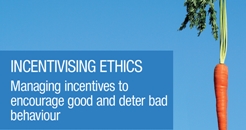 Change incentives to reward ethical behaviour?
Change incentives to reward ethical behaviour?
Many companies have Incentive schemes which are an important part of encouraging the right kind of outcomes be it to improve quality or drive up profitability. Unfortunately, incentives have also historically been one of the main drivers of unethical behaviour by some staff Pressure to meet targets, the imperative to “get the job done” and the need to win business have frequently led to shortcuts resulting in various forms of wrong behaviour, including fraud, trading in influence, anti-competitive practices and the offering, promising or payment of bribes.
What if the incentive scheme in your company was changed to reward ethical behaviour?
Transparency International have recently published a report on this subject; 'Incentivising Ethics: Managing incentives to encourage good and deter bad behaviour'.
Here is a case study in the report to illustrate a case of the wrong behaviour:
Ford’s faulty cost benefit analysis
The requirements for the Ford Pinto were that it was not to weigh an ounce over 2,000 pounds and not cost a cent over US$2,000.1
During design and production in the late 1960s and early 1970s, crash tests revealed a serious defect in the fuel tank. In crashes over 25 miles per hour, the gas tank always ruptured, which could cause a fire. To correct it would have required changing and strengthening the design. In a "cost-benefit analysis" of altering the fuel tanks Ford estimated that the unsafe tanks would cause 180 deaths, 180 serious burn injuries and 2,100 burned vehicles each year. It calculated that it would have to pay US$200,000 per death, US$67,000 per injury, and US$700 per vehicle, making a total of US$49.5 million. On the basis of these calculations, Ford staff chose not to correct the defect. The use of purely financial targets narrowed their focus and led them to ignore ethical and reputational issues that are obvious to outsiders.
And one to illustrate incentivising good behaviour:
A new approach to performance appraisal and sales force incentives at GSK (was Glaxo Smith Kline)
Over the last several years GSK has changed how it rewards its sales force.
Since January 2016, it has ended payments to healthcare professionals (HCPs) to speak on its behalf about its prescription medicines or vaccines.
Medical Representatives are the touch point between the company and the HCPs who are prescribing GSK’s products. The traditional approach in the industry to incentivising
Medical Reps was based on the idea of motivating highly competitive people with monetary rewards based on their personal performance with measures such as direct sales of products or the number of sales calls with doctors to promote specific products. Since January 2015, GSK Pharma Medical Reps and their managers are no longer financially rewarded for the number of individual prescriptions generated. Instead, they are incentivised based on their technical knowledge, the quality of service they deliver to HCPs to support improved patient care, and a broader set of business performance measures. Reps are incentivised to act in the right way for their customers. Managers are incentivised to make sure their reps do so. The focus of interactions between Medical Reps and doctors (or other HCPs) is all about value - enabling doctors to learn something new and useful about the product.
Key principles developed by the report are:
-
Ensuring strong culture and values - the culture supports and encourages ethical business practices, a strong tone from the top along with actions.
-
Risk assessment - could existing incentive structures encourage bad behaviour?
-
Design of ethical incentives - align with culture and values, set appropriate financial and ethical targets, encourage intrinsic reward, no reward for attainment if in breach of principles.
-
Embedding ethical incentives - train and communicate, listen and create space for reflection by staff on work and actions
-
Monitoring and evaluation - internal functions monitor signals, record breaches, adjust incentive structures.
Download the report here.
What about raising the report with senior management, HR, etc. in your company? If you are a business owner, how about reviewing your incentive scheme?
Retweet about this article:
1http://www.engineering.com/Library/ArticlesPage/tabid/85/ArticleID/166/Ford-Pinto.aspx
Geoff Knott, 15/11/2016